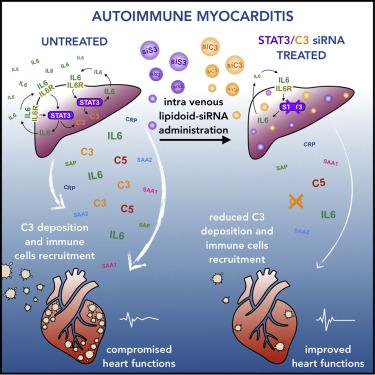Molecular Therapy - Methods & Clinical Development ( IF 4.6 ) Pub Date : 2020-05-22 , DOI: 10.1016/j.omtm.2020.05.023 Lidia Avalle 1 , Francesca Marino 1 , Annalisa Camporeale 1 , Chiara Guglielmi 1 , Daniele Viavattene 1 , Silvio Bandini 1 , Laura Conti 1 , James Cimino 1 , Marco Forni 2 , Cristina Zanini 2 , Alessandra Ghigo 1 , Roman L Bogorad 3 , Federica Cavallo 1 , Paolo Provero 1, 4 , Victor Koteliansky 5, 6 , Valeria Poli 1

|
Myocarditis can lead to autoimmune disease, dilated cardiomyopathy, and heart failure, which is modeled in the mouse by cardiac myosin immunization (experimental autoimmune myocarditis [EAM]). Signal transducer and activator of transcription 3 (STAT3) systemic inhibition exerts both preventive and therapeutic effects in EAM, and STAT3 constitutive activation elicits immune-mediated myocarditis dependent on complement C3 and correlating with activation of the STAT3-interleukin 6 (IL-6) axis in the liver. Thus, liver-specific STAT3 inhibition may represent a therapeutic option, allowing to bypass the heart toxicity, predicted by systemic STAT3 inhibition. We therefore decided to explore the effectiveness of silencing liver Stat3 and C3 in preventing EAM onset and/or the recovery of cardiac functions. We first show that complement C3 and C5 genetic depletion significantly prevents the onset of spontaneous myocarditis, supporting the complement cascade as a viable target. In order to interfere with complement production and STAT3 activity specifically in the liver, we took advantage of liver-specific Stat3 or C3 small interfering (si)RNA nanoparticles, demonstrating that both siRNAs can significantly prevent myocarditis onset and improve the recovery of heart functions in EAM. Our data demonstrate that liver-specific Stat3/C3 siRNAs may represent a therapeutic option for autoimmune myocarditis and suggest that complement levels and activation might be predictive of progression to dilated cardiomyopathy.
中文翻译:

肝脏特异性siRNA介导的Stat3或C3抑制可改善实验性自身免疫性心肌炎的疗效。
心肌炎可导致自身免疫性疾病,扩张型心肌病和心力衰竭,这在小鼠中通过心脏肌球蛋白免疫接种(实验性自身免疫性心肌炎[EAM])进行建模。信号转导和转录激活因子3(STAT3)的全身抑制作用在EAM中起到预防和治疗作用,并且STAT3组成型激活引起免疫介导的心肌炎,依赖于补体C3并与STAT3-白介素6(IL-6)轴的激活相关。在肝脏中。因此,肝脏特异性STAT3抑制作用可能代表了一种治疗选择,可以绕过全身性STAT3抑制作用预测的心脏毒性。因此,我们决定探索沉默Stat3和C3肝脏在预防EAM发作和/或恢复心脏功能方面的有效性。我们首先显示补体C3和C5的遗传耗竭显着阻止了自发性心肌炎的发作,支持补体级联反应作为可行的靶标。为了干扰肝脏中特定的补体生成和STAT3活性,我们利用了肝脏特异性Stat3或C3小干扰(si)RNA纳米颗粒,证明这两种siRNA均可显着预防心肌炎的发作并改善心脏功能。 EAM。我们的数据表明,肝脏特异性Stat3 / C3 siRNA可能代表自身免疫性心肌炎的治疗选择,并提示补体水平和激活可能预示着扩张型心肌病的发展。为了干扰肝脏中特定的补体生成和STAT3活性,我们利用了肝脏特异性Stat3或C3小干扰(si)RNA纳米颗粒,证明这两种siRNA均可显着预防心肌炎的发作并改善心脏功能。 EAM。我们的数据表明,肝特异性Stat3 / C3 siRNA可能代表自身免疫性心肌炎的治疗选择,并提示补体水平和激活可能预示着扩张型心肌病的发展。为了干扰肝脏中特定的补体生成和STAT3活性,我们利用了肝脏特异性Stat3或C3小干扰(si)RNA纳米颗粒,证明这两种siRNA均可显着预防心肌炎的发作并改善心脏功能。 EAM。我们的数据表明,肝脏特异性Stat3 / C3 siRNA可能代表自身免疫性心肌炎的治疗选择,并提示补体水平和激活可能预示着扩张型心肌病的发展。











































 京公网安备 11010802027423号
京公网安备 11010802027423号